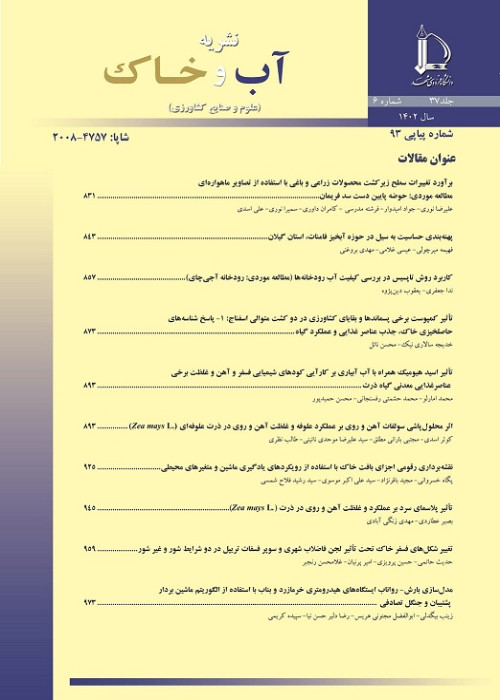Potential of Flavobacterium as Biofertilizer to Increase Wheat Yield
Author(s):
Abstract:
Intoduction: Plant growth promoting rhizobacteria (PGPR) are a diverse group of bacteria consisting different species like Pseudomonas, Azotobacter, Azospirillum, Flavobacterium, Bacillus and Serratia with ability of enhancing plant growth and yield by different mechanisms. Flavobacteria are aerobic, gram negative, rod shape bacteria with more than 100 species living in different habitats ranging from soil and water to the foods. There are reports indicating that Flavobacteria are of dominant rhizosphere bacteria with beneficial effects on agricultural crops. Studies in Iran showed that six species of Flavobacterium were isolated and identified from rhizosphere of wheat. The aim of this study was to evaluate the effect of four strains of Flavobacterium on growth and yield of wheat under field conditions.
Materials And Methods
In this study four strains of Flavobacterium F9, F11, F21 and F40 were used. Bacterial strains were propagated in liquid NB growth medium and were used in field experiments. Fields were prepared in Khorasan Razavi, Khuzestan, Fars, Mazandran and Kermanshah and wheat seeds were inoculated with strains and sowed in a randomized complete block design (RCBD) with five treatments (four strains and a un-inoculated control) with four replications. Wheat varieties were Pishtaz in Khorasan and Fars, Marvdasht in Kermanshah, Chamran in Khuzestan and Milan in Mazandaran. Chemical fertilizers were used based on soil analysis. The rate of inoculation was 10 ml of bacteria per kg of seed. Plants were harvested at the end of the experiment and seed yield, total shoot biomass, 1000-seed weight, plant height, number of panicles per m2, number of seeds per panicle and panicle length were measured. Data analysis was performed by SPSS software, and the means were compared at α꞊5% by Duncan test.Results And Discussion
Results of the study showed that bacterial strains increased growth and yield of wheat in all provinces. In Mazandaran, all strains promoted seed yield although the effect of F21 was not significant. F40 had the highest effect on factors measures in the study. In Khuzestan, inoculation had no significant effect of seed yield production, although yield production was increased compared to control treatment. There was a similar trend regarding to other factors. In Khorasan, all factors were increased except for seed yield and 1000-seed weight due to inoculation with Flavobacterium strains. In Fars, inoculation with strain F40 significantly increased seed yield production by 11.5% compared to control treatment. In Kermanshah, seed yield, total biomass and plant height were significantly affected by inoculation with bacterial strains. Results showed that strain F40 was the most effective strain to increase yield of wheat. This study showed that Flavobacterium as a PGPR bacteria is able to positively affect the growth of wheat in Iran. This is in agreement with experiments in other parts of the world. In Khuzestan, bacteria were not effective on growth of wheat probably due to high soil temperature in this province compared to other provinces.Conclusions
This study revealed that Flavobacteria are present in rhizosphere of wheat in Iran and could improve growth characteristics and yield of wheat in field experiments. Finally, strain F40 was the superior strain which increased seed yield by 15 % compared to control treatment.Keywords:
Language:
Persian
Published:
Journal of water and soil, Volume:30 Issue: 1, 2016
Pages:
125 to 135
magiran.com/p1552410
دانلود و مطالعه متن این مقاله با یکی از روشهای زیر امکان پذیر است:
اشتراک شخصی
با عضویت و پرداخت آنلاین حق اشتراک یکساله به مبلغ 1,390,000ريال میتوانید 70 عنوان مطلب دانلود کنید!
اشتراک سازمانی
به کتابخانه دانشگاه یا محل کار خود پیشنهاد کنید تا اشتراک سازمانی این پایگاه را برای دسترسی نامحدود همه کاربران به متن مطالب تهیه نمایند!
توجه!
- حق عضویت دریافتی صرف حمایت از نشریات عضو و نگهداری، تکمیل و توسعه مگیران میشود.
- پرداخت حق اشتراک و دانلود مقالات اجازه بازنشر آن در سایر رسانههای چاپی و دیجیتال را به کاربر نمیدهد.
In order to view content subscription is required
Personal subscription
Subscribe magiran.com for 70 € euros via PayPal and download 70 articles during a year.
Organization subscription
Please contact us to subscribe your university or library for unlimited access!


